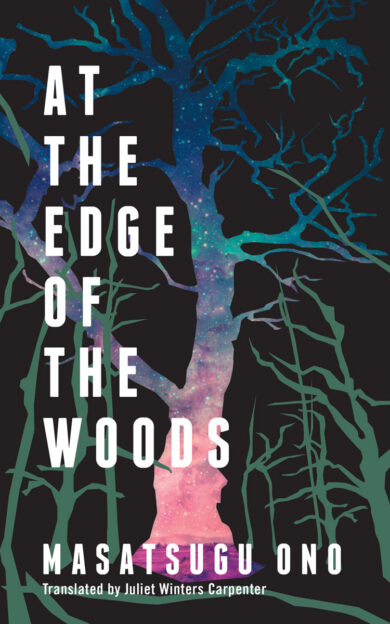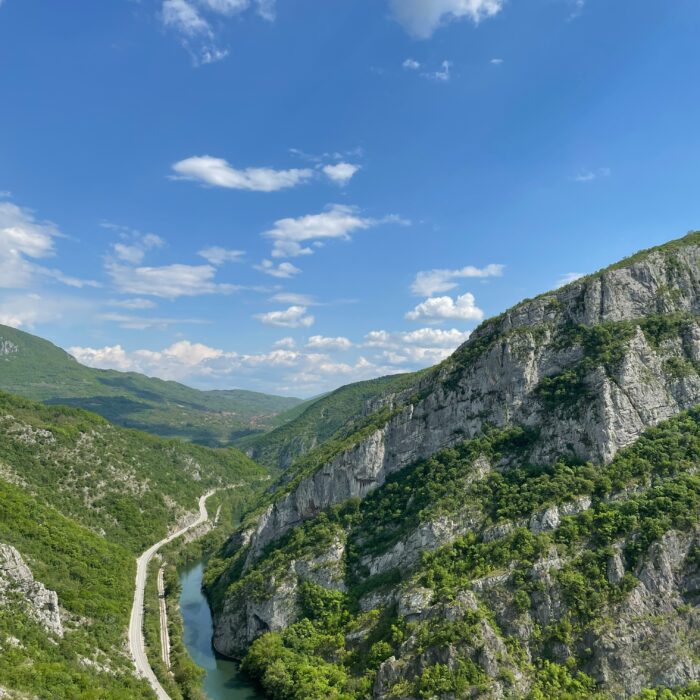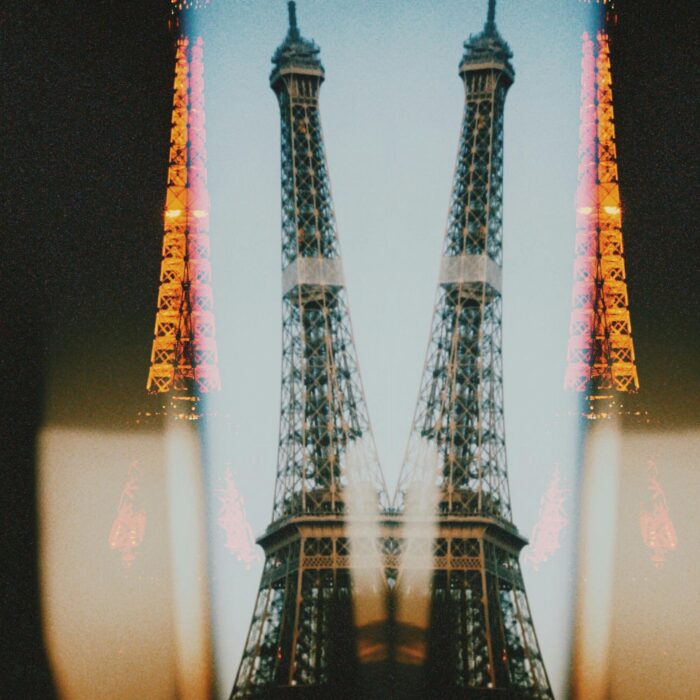You have no items in your cart. Want to get some nice things?
Go shopping
JG Ballard named his autobiography Miracles of Life, primarily for his three children. He writes of “touching the swelling” of his wife’s womb, “willing on this little visitor from beyond time and space under the warmth of my hand.” When his children were delivered, he was profoundly moved: “Far from being young, as young as a human being can be, they seemed immensely old, their foreheads and features streamlined by time, as archaic and smooth as the heads of pharaohs in Egyptian sculpture, as if they had travelled an immense distance to find their parents.”
A similar sense of profound wonder and visceral awe at the “miracle” of childbirth can be found in Masatsugo Ono’s new novel, At the Edge of the Woods, but Ono’s nameless narrator doesn’t share Ballard’s joy at childbirth. On the contrary, he is disturbed and lost, as though trapped with his son in that zone between existence and its precursor.
Ono has acknowledged that he (and indeed most Japanese writers of today) are the “post-Murakami” generation. To begin with, At the Edge of the Woods felt like Murakami paying homage to Stephen King, as Bret Easton Ellis did with his novel Lunar Park. And if there are two fearsome things lurking in the collective psyche of young Japanese minds today, it is surely having children, and moving to the countryside.
As with King’s The Dark Half or Secret Window, Secret Garden, Ono’s central character is an everyday guy disoriented and naive in a prosaic but eerie environment. None of the characters have names, and there are only one or two clues that the novel even takes place in Japan (a bento box and the region of Kinki). The father and husband loves European classical music, and is forever in search of his lost copy of The Origin of the Species. His son loves Bob the Builder, and other Western TV shows. Like Jack Torrence from The Shining, our narrator is a young father who has moved with his pregnant wife and son to an isolated dwelling where nature seems warped and disturbing characters appear.
He doesn’t know if the wood behind their house is big or small. There is gossip among the ancient neighbours of “imps” who live in the wood and occasionally steal things – even unborn children. The wood itself seems to be alive. The trees “pat each other familiarly on the shoulders and back and sometimes wriggle their hips as they hurried ahead… Their whispers spread through the woods like the sound of distant waves. As they traveled, the whispers blotted out not only gaps in consciousness but also the interstices between trees, between branches. Unable to penetrate into the depths of the woods, we would come to a standstill.”
After learning that his wife is pregnant with a second child, the three (or four) of them take walks through the woods. Their son is disturbed by the strange behaviour of the trees, whose branches murmur and shed leaves, but he is also perturbed by the unborn life inside his mother. She moves away to live with her her own mother, and just the father and son are left in their uncanny home as the “dark woods [turn] into a nightmare.”
The wood (and the novel itself) is as claustrophobic as a womb and seems to contain the distant past within it: there’s a castle, a former demilitarized zone with train tracks that have been bombed, and talk of horse-ploughed farms. The people here speak a familiar but incomprehensible language. There is a murmur in the woods, a “sound like coughing. A rope tied unevenly in knots, trying to strangle you from the inside”. It is a sound that “came from the woods, piercing the night, was trying to strangle my heart, too. I knew it was echoing in the dreams of my son, asleep in the same bed. Every time the sound came, his small body couldn’t help wriggling under the sheets like a segment of earthworm.”
The boy adopts an old lady from somewhere or other, because he “wanted a grandma all his own to dote on.” The almost naked old lady has one saggy breast exposed. She tells them about her husband impregnating her before going off to war, and then attempts and fails to squeeze milk from her dried out left breast. The narrator though is naïve and takes the strangest things in his stride. When the old woman loses control of her bowels, our hero simply mops the mess up and gives her her a hot bath, remarking only on her lack of resistance. Even he, it seems, is surprised by his failure to react: “As I was tossing two packs of adult diapers into the back seat of the car, it finally struck me that something was wrong. What had I been thinking, leaving my son alone with that strange old woman? Did I do it because I’d convinced myself that she really was his grandma?”
They get away from the house, once, on an attempt to depart the womb-like region at the airport (the son cries until they go back home), they travel on a train (where they listen to a woman screaming on the phone that she couldn’t have run away – she was just a foetus!), to visit in-laws (who are so tall that our narrator has to look up at them like a child) and they adopt an incontinent dog from a rescue centre run by a ‘tremendously fat’ woman: “My attention was drawn to her breasts. So monumental that each of them could have held an unborn child, they hung down over the many folds of her mounting stomach. What really surprised me was the sudden appearance, poking out from between those pendulous globes, of a pair of little heads. The two squirrels instantly scampered to the top of the woman’s head…”
Breasts of all shapes and sizes, but mostly aged and sagging, feature throughout the book. It’s tempting to suggest that Ono is entering embarrassing r/MenWritingWomen territory here, but that would be doing him an injustice. The infantile obsession men have with breasts is a trope in Japanese literature going back to Junichiro Tanizaki at least, and Ono seems to be creating an unearthly world similar to those of the Surrealist painters, who of course were greatly inspired by Sigmund Freud. And perhaps it is infantile that is the key word. Throughout the novel, the reader is aware that something has gone wrong, that the father and son are trapped in a different world, despite its familiarity. The mother is curiously absent. The narrator is concerned that his son “seemed to be regressing into infancy.” “Was it because he wished to return to a time and a place when happiness was not segmented, when there was no need to understand it as such?” When his son was a baby, “[h]e’d have a faraway look in his eyes, as if recalling those trips through the sky he’d taken while in his mother’s womb. It’s a look unique to babies, as if they have leaped outside the bounds of gravity and time – or rather, a look that transports others outside those bounds.” But, of course, the father seems to us to be as confined as his child, as he himself acknowledges: “As we stood motionless beside the car, the caravan moved forward, like misaligned time that continued to flow. Or perhaps it was we, my son and I, who were trapped in misaligned time.”
It is with a sense of compelling unease that one wanders through the curious world of this novel, as though through a painting by Dali, Magritte or Paul Delvaux. Ono is skillful enough to keep the reader engaged and wondering what is going to happen next (or what on earth is going on), whilst maintaining the surreal, at times even lyrical, atmosphere. The strength of the novel lies in its ambiguity: as with the best poems, I am not sure I understand it, and I want to go back and read it over again.
At the Edge of the Woods is not for the faint-hearted, and most readers will wonder why the narrator is able to walk by disturbing scenes without much ado: “Another time, in the woods my son and I saw the swaying, swollen belly of a dead pregnant woman whom I took to be a refugee.” He concludes that whilst his son may be stealing food in order to feed animals in the woods, he wasn’t feeding refugees, “because when he saw the pregnant woman lying dead in the woods, he cried and ran away.” Perhaps it is not the fear of having children that Ono is exploring in this novel, but the fear of losing a child; and not the fear of living out of town, but of being a literal outsider.
By Masatsugo Ono
Translated from the Japanese by Juliet Winters Carpenter
Two Lines Press, 184 pages
Christopher Redpath
Christopher Redpath is a writer. He studied literature in London, and has lived in Japan and Taiwan.




